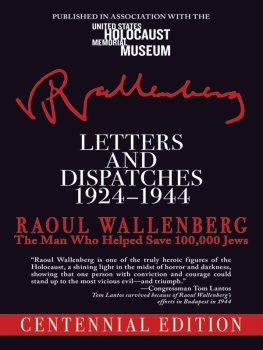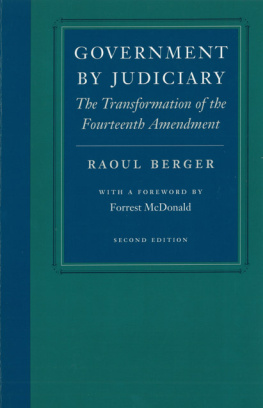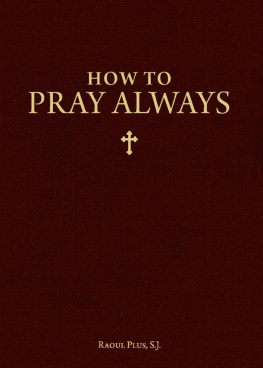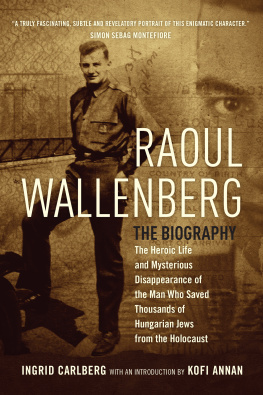Raoul Plus - How to Pray Always
Here you can read online Raoul Plus - How to Pray Always full text of the book (entire story) in english for free. Download pdf and epub, get meaning, cover and reviews about this ebook. year: 2003, publisher: Sophia Institute Press, genre: Religion. Description of the work, (preface) as well as reviews are available. Best literature library LitArk.com created for fans of good reading and offers a wide selection of genres:
Romance novel
Science fiction
Adventure
Detective
Science
History
Home and family
Prose
Art
Politics
Computer
Non-fiction
Religion
Business
Children
Humor
Choose a favorite category and find really read worthwhile books. Enjoy immersion in the world of imagination, feel the emotions of the characters or learn something new for yourself, make an fascinating discovery.
- Book:How to Pray Always
- Author:
- Publisher:Sophia Institute Press
- Genre:
- Year:2003
- Rating:5 / 5
- Favourites:Add to favourites
- Your mark:
- 100
- 1
- 2
- 3
- 4
- 5
How to Pray Always: summary, description and annotation
We offer to read an annotation, description, summary or preface (depends on what the author of the book "How to Pray Always" wrote himself). If you haven't found the necessary information about the book — write in the comments, we will try to find it.
How to Pray Always — read online for free the complete book (whole text) full work
Below is the text of the book, divided by pages. System saving the place of the last page read, allows you to conveniently read the book "How to Pray Always" online for free, without having to search again every time where you left off. Put a bookmark, and you can go to the page where you finished reading at any time.
Font size:
Interval:
Bookmark:



Winning Souls for Christ
Raoul Plus
SOPHIA INSTITUTE PRESS
Manchester, New Hampshire
...................... vii
Part One: The Principles of Prayer
................ 5
........... 19
............... 35
Part Two: The Practice of Prayer
............... 49
............ 75
.............. 87
...................... 123

Editor's note: The biblical quotations in the following pages are taken from the Douay-Rheims edition of the Old and New Testaments. Where applicable, quotations have been cross-referenced with the differing names and enumeration in the Revised Standard Version, using the following symbol: (RSV =).


Now, how far is it possible to put this ideal into practice, and how much is really attainable? How can the implications of this injunction be reconciled with the requirements of our psychological self and our daily life? How can we reach a right understanding of the conflicting call of the invisible world within us and the imperious and quite legitimate demands of the visible world outside us, and reconcile the attractions of a life that we would like to be as contemplative as possible with the duties of an active life?
In a few words, how is it possible to reach a correct understanding of the meaning of recollection and the correct balance between generosity and wisdom?
It is these points that will be explained in these pages.
Three basic principles govern our considerations:
A principle of psychology: it is impossible (exceptional cases apart) to fix our minds always upon God.
A moral principle: to be one with God in will is better than continual recollection.
A principle of ascetic theology: the frequent thought of God is of great assistance in reaching the intimate union of our will with God's.
These ideas may be expressed more briefly without interfering with subsequent fuller explanations, by saying:
To think always of God is impossible.
To think always of God is not necessary.
It is most profitable to think often of God.
These three principles having been laid down, it remains to be seen how the practice of a life of perfect recollection is governed by three laws: to pray well; to turn everything into prayer; and to develop a spirit of prayer.




There is a distinction to be made at the outset that will throw a strong light upon the problem of thinking always of God. We must be on our guard to avoid confusing the act of prayer with the state of prayer. Further on we shall see in what consists the state of prayer.
An act of prayer may be either vocal or mental, according as it is formed of words recited by the lips, or is the inner cry of the soul expressed in formulated or unformulated transports of love, or in the silence of union with God. In these two cases, our thoughts are occupied or trying to be occupied with God.
Our acts of prayer are the moments when our thoughts are in loving union with God. The problem is this: can these moments of loving union with our Lord be brought so close together that they form one almost continuous chain of thought? More briefly: can my thoughts be absorbed without intermission with God? Is it possible to think of nothing but Him?
No. Here lies a double impediment. First, the practical impossibility: our daily duties involve a number of actions other than formulated acts of prayer. There may be a lesson to prepare, a lecture to give, some household task or work of charity to be attended to, or an engrossing intellectual study to be undertaken. And if it is true that it is very difficult to think of one thing while doing another, in most cases and for most people, an occupation, even when only external, absorbs all their energies, including those of the mind. This is due to our natural frailty.
Later we shall endeavor to show how a wise method can somewhat get over this obstacle, but the fact remains. Hemmed in as we are by the visible world of sense, it is only with difficulty that we can have even fragmentary relations with the invisible world. Man is created with a body and soul, and no one can ask of others or require of himself to lead a life of pure spirit.
To this practical difficulty is added another of a psychological character. Even if our occupations were reduced to the minimum, and if, as is the case with a contemplative vocation, we were able to spend a large portion of time in prayer, continuous prayers would still be impossible, for they would soon lead to grave mental derangement and complete powerlessness.
We are not archangels. Even the timetable of the contemplative orders is interspersed with occupations other than contemplative prayer. No one can be continually adding fresh prayers to his usual exercises. It is an illusion, then, to wish never to lose the recollection of God for one instant. Our mental powers are incapable of this.
Doubtless God can endow the soul with special faculties, so as to enable it to live always or nearly always with the thought or consciousness of His presence. In such a case, the ability to remain in the presence of God is not the normal result of our own efforts. It is the action of God, who delights in overwhelming the soul. He enfolds it in a recollection that is more or less impenetrable to outside disturbances. Mystical writers call this infused recollection, to distinguish it from that which is the result of our own efforts and is called acquired recollection. This recollection can progress from the simple mystical touch, which is temporary and often of very short duration, to a union that is continuous. In this case, recollection is permanent, suffering no eclipse of the beloved presence and its enjoyment.
At first, this may lead to moments of such entire absorption that the soul is more or less unfitted to take its place in its accustomed surroundings; that which is seen within is so different from the painted canvas of the outside world. But in the highest stage of union, the soul finds it can easily adjust its sense life to harmonize with its supernatural life; outwardly it behaves like everyone else, while keeping within perpetual contact with the Divine Master. It is bound and it is free, and all the freer for being bound to Him who is sovereign liberty, on whom it is entirely dependent.
Font size:
Interval:
Bookmark:
Similar books «How to Pray Always»
Look at similar books to How to Pray Always. We have selected literature similar in name and meaning in the hope of providing readers with more options to find new, interesting, not yet read works.
Discussion, reviews of the book How to Pray Always and just readers' own opinions. Leave your comments, write what you think about the work, its meaning or the main characters. Specify what exactly you liked and what you didn't like, and why you think so.









